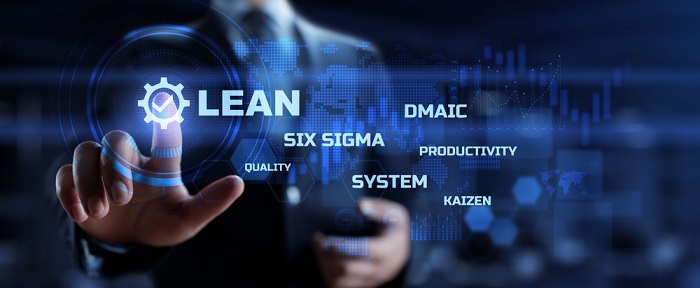
 Data Structure
Data Structure Networking
Networking RDBMS
RDBMS Operating System
Operating System Java
Java MS Excel
MS Excel iOS
iOS HTML
HTML CSS
CSS Android
Android Python
Python C Programming
C Programming C++
C++ C#
C# MongoDB
MongoDB MySQL
MySQL Javascript
Javascript PHP
PHP
- Selected Reading
- UPSC IAS Exams Notes
- Developer's Best Practices
- Questions and Answers
- Effective Resume Writing
- HR Interview Questions
- Computer Glossary
- Who is Who
Lean Project Management Applying Lean Principles to Eliminate Waste and Improve Efficiency
Introduction
In today's fast-paced and competitive business environment, project managers are constantly seeking ways to optimize processes, enhance productivity, and deliver projects successfully. One approach that has gained significant traction is Lean Project Management. Derived from Lean Manufacturing principles, Lean Project Management focuses on eliminating waste, maximizing value, and improving efficiency.
By implementing Lean principles, project managers can streamline workflows, reduce unnecessary activities, and achieve higher levels of productivity. It's worth exploring the core concepts of Lean Project Management which provides insights into how it can revolutionize project delivery.

Understanding Lean Project Management
Lean Project Management is a methodology that aims to increase value and minimize waste in project execution. It originated from the Toyota Production System and has been adapted to various industries, including software development, construction, and healthcare. The primary objective is to deliver projects with fewer defects, reduced lead time, and increased customer satisfaction.
The Eight Wastes
A key aspect of Lean Project Management is identifying and eliminating the eight types of waste: defects, overproduction, waiting, non-utilized talent, transportation, inventory, motion, and extra processing. By eliminating these wastes, project teams can optimize processes, improve efficiency, and create more value for stakeholders.
Value Stream Mapping
Value Stream Mapping (VSM) is a technique used in Lean Project Management to visualize and analyze the flow of activities within a project. It involves mapping the entire project lifecycle, identifying bottlenecks, and eliminating non-value-added activities. VSM helps project managers gain a holistic view of the project, enabling them to identify areas of improvement and optimize the project's value stream.
Continuous Improvement
Continuous Improvement, also known as Kaizen, is a fundamental principle of Lean Project Management. It emphasizes the need for ongoing evaluation, learning, and enhancement of project processes. By fostering a culture of continuous improvement, project teams can identify inefficiencies, implement corrective actions, and enhance overall project performance.
Just-in-Time (JIT) Delivery
Just-in-Time (JIT) delivery is another key concept in Lean Project Management. It focuses on delivering project components, materials, or information at the exact moment they are needed. JIT minimizes inventory and reduces storage costs, ensuring that resources are utilized efficiently. By adopting JIT principles, project teams can optimize the flow of work and minimize delays.
Lean Project Management Tools
Various tools and techniques are available to support Lean Project Management initiatives. Some common tools include Kanban boards, which visualize workflow and help manage tasks; 5S methodology, which ensures workplace organization and cleanliness; and A3 problem-solving, which provides a structured approach to address project issues. These tools enable project teams to identify and address inefficiencies effectively.
Benefits and Challenges of Lean Project Management
Implementing Lean Project Management offers numerous benefits, such as increased efficiency, improved quality, reduced costs, and enhanced customer satisfaction. However, it also presents challenges, including resistance to change, the need for cultural transformation, and the complexity of aligning Lean principles with existing project management frameworks. Understanding and addressing these challenges are critical to successful Lean implementation.
Lean Project Management and Agile Methodologies
Lean Project Management shares similarities with Agile methodologies such as Scrum and Kanban. Both approaches focus on iterative and incremental delivery, customer collaboration, and adaptability.
Agile methodologies emphasize flexibility and responsiveness to change, while Lean Project Management aims to eliminate waste and improve efficiency. Combining Lean principles with Agile methodologies can result in a powerful project management approach that promotes value-driven delivery and continuous improvement.
Employee Engagement and Lean Project Management
Employee engagement is crucial for the successful implementation of Lean Project Management. By involving team members in identifying and eliminating waste, organizations can tap into their knowledge and expertise, fostering a sense of ownership and empowerment. Engaged employees are more likely to actively participate in Lean initiatives, contribute innovative ideas, and drive positive change within the project.
Lean Project Management Case Studies
Examining real-life case studies of organizations that have successfully implemented Lean Project Management can provide valuable insights. Case studies showcase how Lean principles were applied, the challenges encountered, and the outcomes achieved. By studying these examples, project managers can learn from best practices and gain inspiration for their own Lean Project Management endeavors.
Lean Project Management in Virtual Environments
With the increasing prevalence of remote work and virtual teams, adapting Lean Project Management to virtual environments is becoming essential. Leveraging digital collaboration tools, virtual Kanban boards, and video conferencing platforms can enable teams to implement Lean principles effectively in a virtual setting. Overcoming the challenges of distance and time zones through efficient communication and streamlined processes is crucial for achieving Lean project success.
Continuous Learning and Adaptation
Lean Project Management is not a one-time implementation; it requires continuous learning, adaptation, and evolution. Project managers should encourage a culture of learning, encourage feedback, and regularly review and refine processes. By fostering a mindset of continuous improvement, project teams can consistently optimize their performance and deliver value to stakeholders.
Conclusion
Lean Project Management offers a holistic and systematic approach to project execution, focusing on eliminating waste, improving efficiency, and delivering value to stakeholders. By embracing Lean principles, project managers can transform their projects into lean and agile processes, reducing waste, enhancing productivity, and achieving superior results.
The journey to Lean Project Management requires commitment, employee engagement, and a culture of continuous improvement. As organizations strive for excellence in project delivery, Lean Project Management provides a powerful framework to drive success in an ever-evolving business landscape.
Lean Project Management offers a systematic approach to eliminate waste, optimize processes, and improve project efficiency. By adopting Lean principles, project managers can drive value creation, enhance productivity, and deliver projects with greater speed and accuracy. Although implementing Lean Project Management requires effort and a change in mindset, the rewards are substantial.
Embracing Lean practices can empower project teams to achieve exceptional results, exceed stakeholder expectations, and stay ahead in today's dynamic business landscape.

